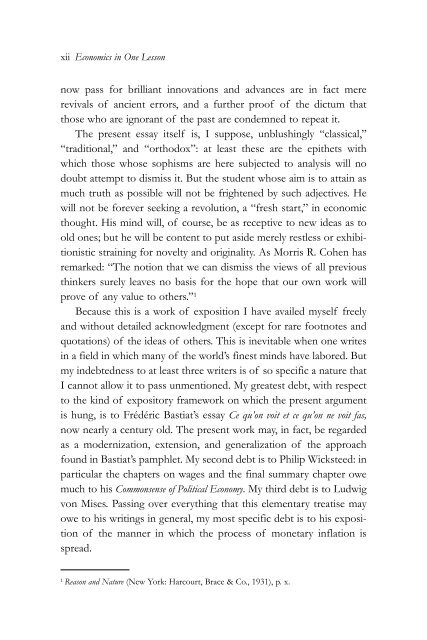1gDdM7w
1gDdM7w
1gDdM7w
- No tags were found...
Create successful ePaper yourself
Turn your PDF publications into a flip-book with our unique Google optimized e-Paper software.
xii Economics in One Lessonnow pass for brilliant innovations and advances are in fact mererevivals of ancient errors, and a further proof of the dictum thatthose who are ignorant of the past are condemned to repeat it.The present essay itself is, I suppose, unblushingly “classical,”“traditional,” and “orthodox”: at least these are the epithets withwhich those whose sophisms are here subjected to analysis will nodoubt attempt to dismiss it. But the student whose aim is to attain asmuch truth as possible will not be frightened by such adjectives. Hewill not be forever seeking a revolution, a “fresh start,” in economicthought. His mind will, of course, be as receptive to new ideas as toold ones; but he will be content to put aside merely restless or exhibitionisticstraining for novelty and originality. As Morris R. Cohen hasremarked: “The notion that we can dismiss the views of all previousthinkers surely leaves no basis for the hope that our own work willprove of any value to others.” 1Because this is a work of exposition I have availed myself freelyand without detailed acknowledgment (except for rare footnotes andquotations) of the ideas of others. This is inevitable when one writesin a field in which many of the world’s finest minds have labored. Butmy indebtedness to at least three writers is of so specific a nature thatI cannot allow it to pass unmentioned. My greatest debt, with respectto the kind of expository framework on which the present argumentis hung, is to Frédéric Bastiat’s essay Ce qu’on voit et ce qu’on ne voit fas,now nearly a century old. The present work may, in fact, be regardedas a modernization, extension, and generalization of the approachfound in Bastiat’s pamphlet. My second debt is to Philip Wicksteed: inparticular the chapters on wages and the final summary chapter owemuch to his Commonsense of Political Economy. My third debt is to Ludwigvon Mises. Passing over everything that this elementary treatise mayowe to his writings in general, my most specific debt is to his expositionof the manner in which the process of monetary inflation isspread.1Reason and Nature (New York: Harcourt, Brace & Co., 1931), p. x.


